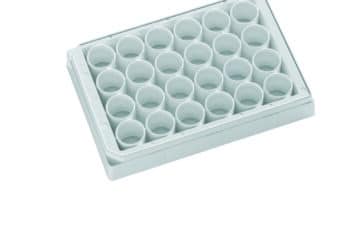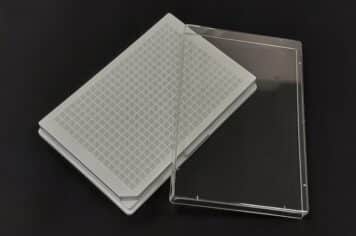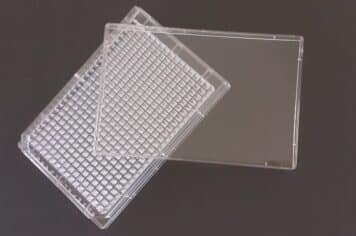No products in the cart.
Cell and Tissue Culture plates
Cell and Tissue Culture Treated Plates have an ideal surface which enables most adherent cells to grow healthily and reproducibly.
The Cell and Tissue Culture Plates (also generically called TC plates) offer optimal, uniform and compatible surface support for animal cell attachment and growth...
[Read more]
This particular surface is obtained by proprietary vacuum plasma treatment that, thanks to its strictly controlled parameters, warrants consistency of behaviour of the surface. Untreated polystyrene surface isn’t suitable for cell attachment due to the surface chemistry of the polystyrene; the TC Surface treatment guarantees that the surface chemistry offers a uniform surface with both hydrophilic and negative charge properties. This treatment will lead to increased cell attachment.
Cell and Tissue Culture Treated Plates are inexpensive, disposable and are the most extensively used cell culture material both afore mentioned qualities both for biological affinity.
Cell and Tissue Culture is one the primary tools used in molecular and cellular biology because it provides an excellent model system for studying the physiology and biochemistry of cells.
Cell Culture and Tissue Culture are two types of processes used to artificially grow cells of multicellular organisms outside their natural environment, in an artificial and controlled medium where it is basically reproduction and survival of cells.
The main difference between cell culture and tissue culture is that cell culture is the laboratory process in which cells are grown under controlled conditions in vitro whereas tissue culture is the growth of cells taken from a multicellular organism.
Cell and Tissue Culture Treated Plates Applications
- to study normal cell homeostasis, cell biochemistry, metabolism, mutagenesis, diseases, and compound effects
- a model system for diseases and drug screening
- powerful tool in cellular and molecular biology
Cell and Tissue Culture Treated Plates are offered in different formats, all sterile with lid:
24 Well Cell and Tissue Culture Treated Plates
96 Well Cell and Tissue Culture Treated Plates
384 Well Cell and Tissue Culture Treated Plates
Poly-D-Lysine and Poly-L-Lysine Coated Plates
With some cell types, to enhance cell attachment, growth and differentiation, the support’s plastic must have a thin layer of polymer polycationic that helps the cells, or tissues, to adhere to the surface. This enhanced surface is obtained by the coating of Poly-Lysine, a synthetic positively charged polymer.
Biomat has developed Surface Treatments specific to Tissue and Cells Culture to help researchers solve their needs.
Poly-D Lysine and Poly-L-Lysine Coated Plates are offered in different formats, all sterile with lid:
96 Well Plates – Poly-D-Lysine Coated Tissue Culture plates
384 Well Plates – Poly-D-Lysine Coated Tissue Culture plates
96 Well Plates – Poly-L-Lysine Coated Tissue Culture plates
384 Well Plates – Poly-L-Lysine Coated Tissue Culture plates







